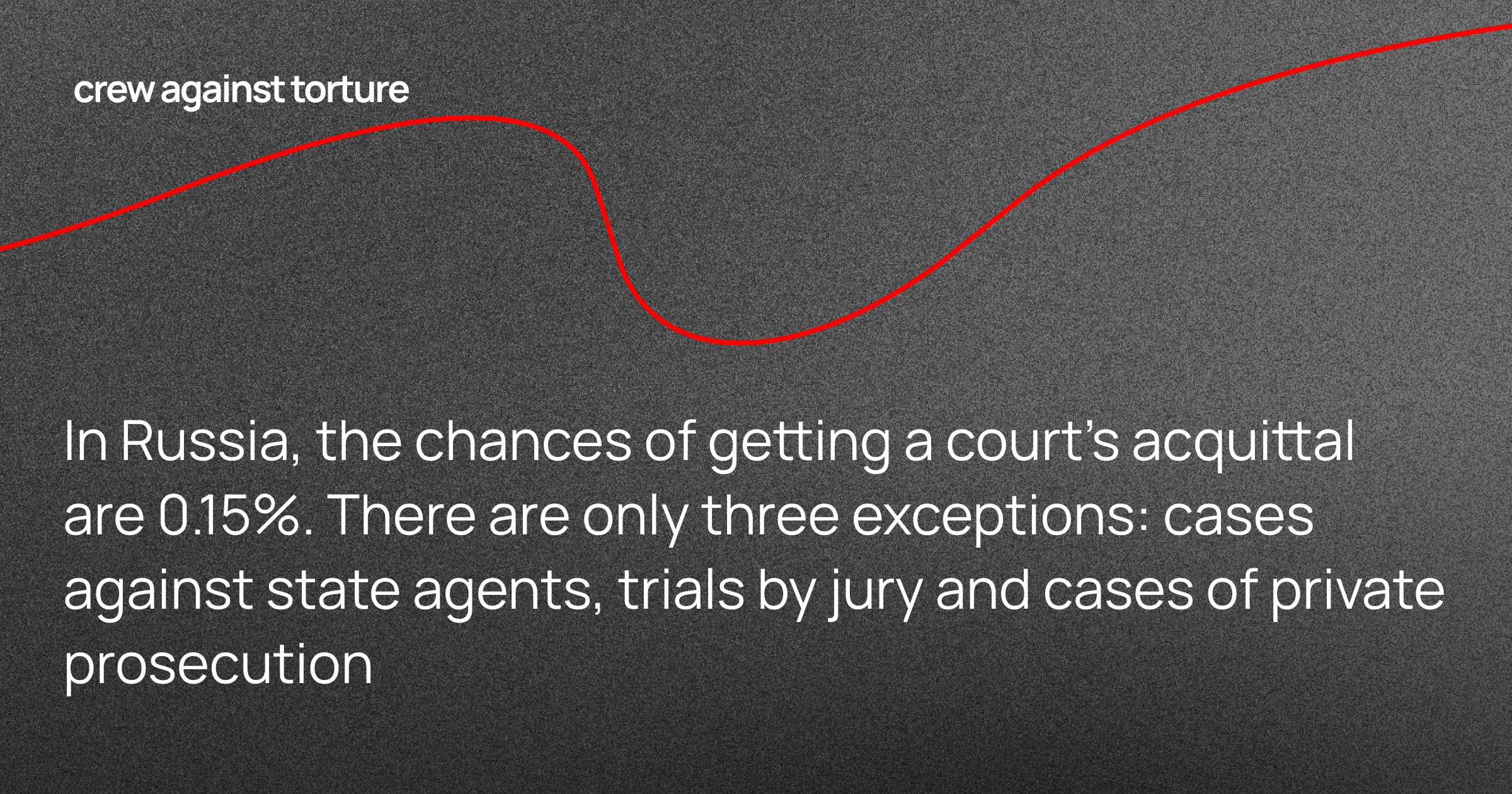НАСТОЯЩИЙ МАТЕРИАЛ (ИНФОРМАЦИЯ) ПРОИЗВЕДЕН, РАСПРОСТРАНЕН И (ИЛИ) НАПРАВЛЕН ИНОСТРАННЫМ АГЕНТОМ «КОМАНДА ПРОТИВ ПЫТОК» ЛИБО КАСАЕТСЯ ДЕЯТЕЛЬНОСТИ ИНОСТРАННОГО АГЕНТА «КОМАНДА ПРОТИВ ПЫТОК» | 18+
The analyst of the Crew Against Torture scrutinized the statistics of the Judicial Department under the Supreme Court of the Russian Federation and found out that in Russia over the past 15 years the number of acquittals has never reached the well-known figure of 1%. The Russian courts were closest to this figure in 2011, and since then the proportion of acquittals has decreased several times.
In mid-April, the Judicial Department published the official statistics for 2022. It follows that only one tried person out of 676 has a chance of a court’s acquittal. This is not even 1%, but only 0.15% of all defendants. 80% of the remaining individuals become convicts. The remaining 20% of defendants witness the closure of their case without any sentence (for example, because of the expiration of the statute of limitations, in the event of the death of the tried person, reconciliation with the victim, and so on). Of this number, only a small proportion of the courts’ rulings provide rehabilitative grounds for such closure (0.13%). About another 1% of the courts’ rulings consist in the application of coercive medical measures to the defendant or in the return of the case to the prosecutor for eliminating various shortcomings listed in the Code of Criminal Procedure (in this circumstance, the case may well end up in court again).
The proportion of those convicted over the past 15 years has been slowly but surely growing, while those acquitted are decreasing. At the same time, in absolute figures, the total number of people who went in 2022 through the courts decreased by 40% over 15 years.
The Russian courts were closest to 1% of acquittals in 2011: then 0.81% were acquitted. However, even nowadays, there is a special category of cases and, respectively, there are some groups of individuals who are acquitted more often than others. These are cases in which the defendants are officials or employees of law enforcement agencies. Article 286 of the Criminal Code — the leader of the rating — is devoted to the cases against state officials. The range of punishable acts can vary: from bribes, embezzlement and violations in the budget sphere to the use of violence and torture. In such cases, where the defendants are from «the system», the trials are especially loyal — these individuals are acquitted 25 times more often than others.
However, even in relation to the representatives of the state, the judicial machine has been more cruel in recent years: according to the most severe rule (para. «c» of Part 3 of Article 286 of the Criminal Code that punishes for grave consequences to the victim), there is the same tendency to reduce the number of acquittals. The proportion of such acquittals over the past 4 years has been gradually decreasing — from 12% in 2019 to 5% in 2022.
On the other hand, more and more often, the participants of the special military operation on the territory of Ukraine, having been convicted, are exempted from punishment, and those who are under investigation are evading prosecution for legitimate reasons from the point of view of the State. A few years ago, we could not predict such a tendency. We see the formation of new privileged groups — individuals to whom the system is especially loyal.
The second situation, when the chance of an acquittal is higher, is a trial by jury. Russian statistics show that with the participation of the jury, the proportion of acquittals in the first instance is a hundred times higher than in ordinary court proceedings. However, in Russia, «excessively lenient» jury verdicts are much more likely to be overturned by the appellate courts. Most often, Russian courts indicate some formal violations as grounds for quashing a jury verdict, and therefore state representatives use a variety of relevant strategies to prevent any jury acquittal. Moreover, if the jury delivers a guilty verdict, professional judges impose a significantly higher penalty than if the case was heard without a jury.
The third group of cases with a higher proportion of acquittals is simplified sets of proceedings in private prosecution cases. This type of trial has the lowest chance of conviction: in 2022, less than half of the defendants received a sentence.
This is because some of the cases of private prosecution are carried out without state prosecution. For example, if the victim believes that he or she was slandered and the victim probably knows who did it, they can directly apply to the justice of peace, form the evidence base and act as a prosecutor. Despite the fact that the share of convictions for such crimes has approximately doubled over the past decade and a half, the mechanism of private prosecution is used less and less: in absolute figures, the number of those who went through this type of trial over the years have decreased by 15 times.
From the analysis of statistics on trials by jury and private prosecution trials, one can conclude that the less the state is involved in criminal proceedings, the higher the defendant’s chances of receiving an acquittal or closing the case on rehabilitative grounds. It turns out that in Russia the system is at war with acquittals at every stage of criminal proceedings, because the conviction is a sort of indicator showing the effectiveness of the law enforcement agencies’ work.
